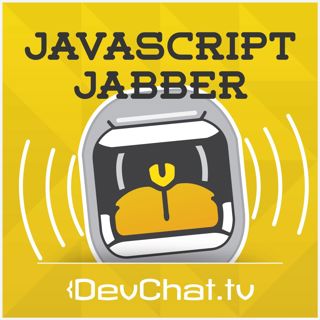
JSJ 380: Expo for Web with Charlie Cheever
SponsorsDatadogSentry– use the code “devchat” for $100 credit PanelCharles Max WoodWith Special Guest: Charlie CheeverEpisode SummaryGuest Charlie Cheever joins the discussion on JavaScript Jabber today. He was previously on React Round Up episode 47. Charlie works on Expo, which is a way to make React apps on every platform. Right now, Expo supports IOS, Android, and Web, provides a standard library of features, and takes care of services like builds and updates over the air. There are also code generators and templates available in Expo. Expo is focused on use cases where you just need to use a little bit of React Native in your app. Charlie talks about the origins of Expo, which was born from increased access of websites from people’s phones and the desire for a cross-platform tool that was as easy as building on the web. One of the biggest benefits is that Expo gives you the peace of mind knowing your app will work across all phones and all platforms.They discuss how to approach building your API’s for Expo so that it’s easy for people to use and have it consistent across all these different systems. Expo also has a voting board canny.expo.io where people can submit suggestions for new features. Expo is compatible with map view and React Native maps. Currently, Expo is missing bluetooth and things where the underlying platform wants to have a direct relationship with the developer, such as in-app purchases. Charlie talks about other components available in Expo, all of which can be modified. They discuss the influence of React on augmented reality and VR. Charlie talks about the updating feature of Expo. Charlie talks about the evolution of Expo and their goal to be a “developer first” company. He talks about the company, libraries, The Client, and services. He gives advice on how to get started with React Native development and using Expo. There is also Expo Web, which can be used to create a website, and if you create an app with Expo you get a website too. Expo hopes to be a stable, easy, coherent way of using all these tools across your entire experience of building your application so that you can relax a little bit. Click here to cast your vote NOW for JavaScript Jabber - Best Dev Podcast AwardLinksExpoFlexValvejQueryExpo voting boardLottieFilesSQLiteReact Native MapsThe Client appSnack.expo.ioNPM Follow DevChat on Facebook and Twitter PicksCharles Max Wood:Vdot02Zoom H6 Portable 6 track RecorderShure SM58-LC Cardioid Dynamic Vocal MicrophoneChain React ConfCharlie Cheever:Draft bit (still in beta)AWS AmplifyFollow Charlie @ccheeverSpecial Guest: Charlie Cheever. Support this podcast at — https://redcircle.com/javascript-jabber/donationsPrivacy & Opt-Out: https://redcircle.com/privacyBecome a supporter of this podcast: https://www.spreaker.com/podcast/javascript-jabber--6102064/support.
6 Aug 201950min

JSJ 379: FindCollabs and Podcasting with Jeff Meyerson
SponsorsNetlifyRxJS Live PanelAimee KnightAJ O’NealCharles Max WoodWith Special Guest: Jeff MeyersonEpisode SummaryJeff Meyerson is the host of the Software Engineering daily podcast and has also started a company called FindCollabs, an online platform for finding collaborators and building projects. Jeff started FindCollabs because he believes there are all these amazing tools but people are not combining and collaborating as much as they could, when so much good could be accomplished together. FindCollabs is especially useful for working on side projects. The panelists discuss the problems encountered when you try to collaborate with people over the internet, such as finding people who are facing similar and gauging interest, skill, and availability. Thankfully, FindCollabs has a feature of leaving reviews and rating your partners so that users can accurately gauge other’s skill level. Users can also leave comments about their experience collaborating with others. The only way you can show competence with an interest is to contribute to another project. FindCollabs is also a good place to look for mentors, as well as for Bootcamp graduates or people going through an online coding course. If you are part of an organization, you can create private projects. The company plans to expand this feature to all users in the future.The panelists talk about their past experiences with collaborating with other people.Jeff talks about his podcast Software Engineering Daily and how it got started and the focus of the podcast. As someone working in technology, it is important to stay current on up and coming technology, and listening to podcasts is an excellent way to do that. Jeff talks about where he thinks podcasting is going, especially for programmers. The panel discusses some of the benefits of listening to programming podcasts. Jeff talks about how he is prepping Software Engineering Daily for the future. He shares the audience size for Software Engineering Daily and some of the statistics for his different channels. Jeff has also released an app for Software Engineering Daily, and he shares some information on how it was written. Finally, Jeff gives advice for people who want to use FindCollabs and some of the next steps after creating a profile.Click here to cast your vote NOW for JavaScript Jabber - Best Dev Podcast AwardLinksFindCollabsGreenlockTelebitSwingCycleSoftware Engineering Daily Follow DevChat on Facebook and Twitter PicksAimee Knight:Burnout and the BrainAJ O’Neal:Saber’s Edge from Final Fantasy by Distant WorldsGreenlock on FindCollabsTelebit on FindCollabsCharles Max Wood:Adventures in Machine Learning on FindCollabsAdventures in Virtual Reality on FindCollabsAdventures in Python on FindCollabsAdventures in Java on FindCollabsAir conditioningMFCEO ProjectJeff Meyerson:Follow Jeff @the_prion Listen NotesLinbin’s Podcast PlaylistHidden Forces PodcastSpecial Guest: Jeff Meyerson. Support this podcast at — https://redcircle.com/javascript-jabber/donationsPrivacy & Opt-Out: https://redcircle.com/privacyBecome a supporter of this podcast: https://www.spreaker.com/podcast/javascript-jabber--6102064/support.
1 Aug 201959min

JSJ 378: Stencil and Design Systems with Josh Thomas and Mike Hartington
SponsorsDatadogSentry use code “devchat” for 2 months free PanelAimee KnightChris FerdinandiJoe EamesAJ O’NealCharles Max WoodWith Special Guests: Josh Thomas and Mike HartingtonEpisode SummaryToday’s guests Josh Thomas and Mike Hartington are developers for Ionic, with Josh working on the open source part of the framework on Ionic. They talk about their new compiler for web components called Stencil. Stencil was originally created out of work they did for Ionic 4 (now available for Vue, React, and Angular) and making Ionic 4 able to compliment all the different frameworks. They talk about their decision to build their own compiler and why they decided to open source it. Now, a lot of companies are looking into using Stencil to build design systemsThe panel discusses when design systems should be implemented. Since Ionic is a component library that people can pull from and use themselves, Jeff and Mike talk about how they are using Stencil since they’re not creating a design system. The panel discusses some of the drawbacks of web components. They discuss whether or not Cordova changes the game at all. One of the big advantages of using Stencil is the code that is delivered to a browser is generated in such a way that a lot of things are handled for you, unlike in other systems.The panelists talk about their thoughts on web components and the benefits of using a component versus creating a widget the old fashioned way. One such benefit of web components is that you can change the internals of how it works without affecting the API. Josh and Mike talk about some of the abilities of Stencil and compare it to other things like Tachyons. There is a short discussion of the line between frameworks and components and the dangers of pre optimization. If you would like to learn more about Stencil, go to stenciljs.com and follow Josh and Mike @Jtoms1 and @mhartington. Click here to cast your vote NOW for JavaScript Jabber - Best Dev Podcast AwardLinksBuilding Design Systems book StencilCordovaShadow DOMTachyons Ionic 4 Follow DevChat on Facebook and Twitter PicksAimee Knight:What Does Debugging a Program Look Like?AJ O’Neal:Legend of Zelda: Link’s AwakeningNeon Genesis Evangelion soundtrackPrettierChris Ferdinandi:Kindle PaperwhiteCompany of OneCharles Max Wood:Ladders with feetLighthouseAcornsJoe Eames:Moment.jsHow To Increase Your Page Size by 1500% articleDay.jsJosh Thomas:Toy Story 4Mike Hartington:Building Design SystemsYoumightnotneed.comSpecial Guests: Josh Thomas and Mike Hartington. Support this podcast at — https://redcircle.com/javascript-jabber/donationsPrivacy & Opt-Out: https://redcircle.com/privacyBecome a supporter of this podcast: https://www.spreaker.com/podcast/javascript-jabber--6102064/support.
30 Jul 201952min

JSJ BONUS EPISODE: Observables and RxJS Live with Aaron Frost
JSJ BONUS EPISODE: Observables and RxJS Live with Aaron FrostMon Jul 29 2019 13:00:56 GMT+0300 (+03) Episode Number: bonus Duration: 29:35https://media.devchat.tv/js-jabber/JSJ_Bonus_Aaron_Frost.mp3 Host: Charles Max Wood Joined by Special Guest: Aaron FrostEpisode SummaryAaron Frost joins Charles to talk about what Observables are and why developers should learn about them and use them in their code. He explains the difference between Observables, Promises and Callbacks with an example. Aaron then invites all listeners to attend the upcoming RxJS Live Conference and introduces the impressive speaker line-up. The conference will take place on September 5-6 in Las Vegas and tickets are still available. Aaron also offers a $100 discount to all listeners with the code "chuckforlife". For any questions you can DM Aaron at his Twitter account.LinksRxJS Live ConferenceRxJS Conference TicketsAaron's TwitterPromisesCallbacksSpecial Guest: Aaron Frost. Support this podcast at — https://redcircle.com/javascript-jabber/donationsPrivacy & Opt-Out: https://redcircle.com/privacyBecome a supporter of this podcast: https://www.spreaker.com/podcast/javascript-jabber--6102064/support.
29 Jul 201929min

JSJ 377: Bringing Maps and Location Into Your Apps with the ArcGIS API for JavaScript with Rene Rubalcava
SponsorsDatadog Sentry use code “devchat” for 2 months free PanelAimee KnightAJ O’NealCharles Max WoodWith Special Guest: Rene RubalcavaEpisode SummaryRene is a software developer for ESRI and works in spatial and mapping software. ESRI has been around since 1969 and has seen their work explode since they shifted to providing address and location services. Rene talks about how he thinks about location and mapping when building software around it and things that he has to approach in unique ways. The panel discusses some of their past experiences with location software. Some of the most difficult aspects of this software is changing time zones for data and actually mapping the Earth, since it is not flat nor a perfect sphere. Rene talks about the different models used for mapping the Earth.Most mapping systems use the same algorithm as Google maps, so Rene talks about some of the specific features of ArcGIS, including the ability to finding a point within a polygon. Rene talks about what routing is, its importance, and how it is being optimized with ArcGIS, such as being able to add private streets into a regular street network.The panel discusses how the prevalence of smartphones has changed mapping and GPS and some of their concerns with privacy and location mapping. One thing ESRI is very careful about is not storing private information. Rene talks about the kinds of things he has seen people doing with the mapping and location data provided by ArcGIS, including a Smart Mapping feature for developers, mapping planets, indoor routing, and 3D models. LinksWebricate EsriArcGIS Follow DevChat on Facebook and Twitter PicksRene Rubalcava:Old Man’s War seriesAlways Be My MaybeRene’s websiteAJ O’Neal:INTLColorfulTime zones in PostgressTime zones in JavaScriptAimee Knight:Advice to Less Experienced DevelopersCharles Max Wood:Heber Half MarathonNetlify CMSVillainousFirefoxSpecial Guest: Rene Rubalcava . Support this podcast at — https://redcircle.com/javascript-jabber/donationsPrivacy & Opt-Out: https://redcircle.com/privacyBecome a supporter of this podcast: https://www.spreaker.com/podcast/javascript-jabber--6102064/support.
25 Jul 201943min

JSJ 376: Trix: A Rich Text Editor for Everyday Writing with Javan Makhmali
Sponsors DatadogSentry use code “devchat” for 2 months free PanelAimee KnightChris FerdinandiChristopher BeuchelerAJ O’NealWith Special Guest: Javan MakhmaliEpisode SummaryToday’s guest is Javan Makhmali, who works for Basecamp and helped develop Trix. Trix is a rich text editor for the web, made purposefully simple for everyday use instead of a full layout tool. Trix is not the same as Tiny MCE, and Javan discusses some of the differences. He talks about the benefits of using Trix over other native browser features for text editing. He talks about how Trix has simplified the work at Basecamp, especially when it came to crossing platforms. Javan talks more about how Trix differs from other text editors like Google Docs and contenteditable, how to tell if Trix is functioning correctly, and how it works with Markdown.The panel discusses more specific aspects of Trix, such as Exec command. One of the features of Trix is it is able to output consistently in all browsers and uses semantic, clean HTML instead of classnames. Javan talks about how Trix handles getting rid of the extraneous cruft of formatting when things are copy and pasted, the different layers of code, and the undo feature. He talks about whether or not there will be more features added to Trix. The panel discusses who could benefit from using Trix. The show finishes with Javan talking about Basecamp’s decision to make Trix open source and why they code in CoffeeScript. LinksTrixTiny MCEContenteditableMarkdownSVGHTMLCoffeeScript Follow DevChat on Facebook and Twitter PicksJavan Makhmali:API for form submissionsChris Ferdinandi:CSS GridAlex Russel Twitter threadHow To Live a Vibrant Life with Early Stage DementiaAJ O’Neal:Mario and ChillChip Tunes 4 Autism: CatharsisToilet AugerChristopher Beucheler: Medium to Own blogAimee Knight:Absolute Truth Unlearned as Junior DeveloperSpecial Guest: Javan Makhmali. Support this podcast at — https://redcircle.com/javascript-jabber/donationsPrivacy & Opt-Out: https://redcircle.com/privacyBecome a supporter of this podcast: https://www.spreaker.com/podcast/javascript-jabber--6102064/support.
23 Jul 201952min

JSJ 375: Are You Hurting the Web?
SponsorsTriplebyte $1000 signing bonus Sentry use code “devchat” for 2 months free PanelCharles Max WoodAimee KnightChris FerdinandiAJ O’NealChristopher BeuchelerEpisode SummaryToday the panel discusses the effect of current development practices, such as the heavy reliance JavaScript, on the web. Chris explains why he believes that current development practices are ruining the web. The panelists discuss different situations where they see complications on the web. They discuss the advantages and disadvantages of using an enterprise scale platform like React. The panel discusses Twitter’s move away from their legacy code base to CSS and JavaScript. The panelists agree that the way things are built, since it’s so JavaScript heavy, is alienating to people who work with other languages, and in turn other areas like UI are undervalued. They talk about possible reasons things ended up this way and some of the historical perception of a frontend as not a place for ‘real’ development. Because the web is now a serious platform, things associated with the backend has been thrown at the frontend where it doesn’t belong. They talk about changes in the ways programming is viewed now versus the past. There is a discussion about how market demands that have influenced the web and if the market value CSS as highly as other languages. They mention some of the Innovations in CSS. Chris shares his solutions for the problems they’ve been discussing, namely using less JavaScript, leaning more heavily on what the browser gives you out of the box, and avoiding dependency where possible. They talk about ways to get involved if you want to take a leaner approach to the web. Ultimately, it is important to embrace things about the past that worked, but sprinkle in new technology when it makes senseLinksStimulusReactVueAppleScriptPerl.NETAngular Follow DevChat on Facebook and Twitter PicksCharles Max Wood:Tiny Epic GalaxiesEverywhereJSAimee Knight:Complete Guide to Deep WorkChris Ferdinandi:Developer Bait and SwitchVanillajslist.com Chris will be speaking at Artifact ConferenceAJ O’Neal:Weird Al: White and NerdyQuantum board gameDeploy Sites with Only Git and SSHChristopher Beucheler:MaterialMonstressSupport this podcast at — https://redcircle.com/javascript-jabber/donationsPrivacy & Opt-Out: https://redcircle.com/privacyBecome a supporter of this podcast: https://www.spreaker.com/podcast/javascript-jabber--6102064/support.
18 Jul 20191h 6min

JSJ 374: CosmosDB with Steve Faulkner LIVE at Microsoft BUILD
SponsorsDataDogSentry use the code “devchat” for 2 months free on Sentry small planCacheFlyPanelCharles Max Wood Joined by Special Guest: Steve FaulknerEpisode SummaryComing to you live from the podcast booth at Microsoft BUILD is Charles Max Wood with Steve Faulkner. Steve is a Senior Software Developer for Azure Cosmos DB at Microsoft. Cosmos DB is a global distributed, multi-model noSQL database. Steve explains the Cosmos DB service and scenarios it can be used in. They discuss how Cosmos DB interacts with Azure functions and how partition keys work in Cosmos DB.Listen to the show for more Cosmos DB updates and to find out how Steve he got his twitter handle @southpolesteve.LinksSteve’s GitHubSteve’s TwitterSteve’s LinkedInSteve Dev.toMicrosoft Build 2019 Introduction to Azure Cosmos DBAiA 241: Azure Functions with Colby Tresness LIVE at Microsoft BUILDAiA 242- Azure Functions Part II with Jeff Hollan LIVE at Microsoft BUILDMicrosoft Learn ResourcePartitioning in Azure Cosmos DBPicksSteve Faulkner:FINAL FANTASY X/X-2 HD Remaster for Nintendo SwitchOvercooked on SteamFastlySpecial Guest: Steve Faulkner. Support this podcast at — https://redcircle.com/javascript-jabber/donationsPrivacy & Opt-Out: https://redcircle.com/privacyBecome a supporter of this podcast: https://www.spreaker.com/podcast/javascript-jabber--6102064/support.
16 Jul 201930min






















